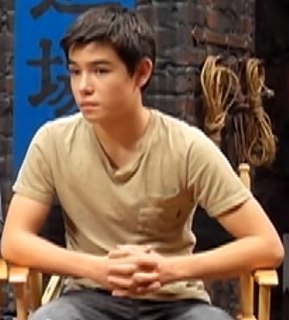A Quote by Billy Collins
Every Day Is for the Thief is a vivid, episodic evocation of the truism that you can't go home again; but that doesn't mean you're not free to try. A return to his native Nigeria plunges Cole's charming narrator into a tempest of chaos, contradiction, and kinship in a place both endearingly familiar and unnervingly strange. The result is a tale that engages and disturbs.
Related Quotes
Every Day Is for the Thief, by turns funny, mournful, and acerbic, offers a portrait of Nigeria in which anger, perhaps the most natural response to the often lamentable state of affairs there, is somehow muted and deflected by the author's deep engagement with the country: a profoundly disenchanted love. Teju Cole is among the most gifted writers of his generation.
I found a deep kinship between Mahler's recurrent attempts to confront all sides of life and to affirm himself in the face of his own finitude, and Aschenbach's dedication to persevere in the literary evocation of beauty. Exploring this kinship led me to reflect on many of Mahler's songs and symphonies - and particularly his great masterpiece, Das Lied von der Erde. The end result was a way of reading Mann that I hadn't originally anticipated at all.
Philosophy, beginning in wonder, as Plato and Aristotle said, is able to fancy everything different from what it is. It sees the familiar as if it were strange, and the strange as if it were familiar. It can take things up and lay them down again. It rouses us from our native dogmatic slumber and breaks up our caked prejudices.
A human life, I think, should be well rooted in some spot of a native land, where it may get the love of tender kinship for the face of earth, for the labors men go forth to, for the sounds and accents that haunt it, for whatever will give that early home a familiar, unmistakable difference amidst the future widening of knowledge.
Home is the place you return to when you have finally lost your soul. Home is the place where life is born, not the place of your birth, but the place where you seek rebirth. When you no longer have to remember which tale of your own past is true and which is an invention, when you know that you are an invention, then is the time to seek out your home. Perhaps only when you have come to understand that can you finally reach home.
Yes, both 'Being Human' and 'Outlander' are known for their loyal fanbases. The beauty of both of those jobs was that the characters were very removed from me. So I've been lucky to get off scot-free, without any strange encounters. The wigs, blood, and strange onscreen faces/voices - they haven't found their way into my day-to-day life. Yet.
I go up to San Francisco on holidays and spend time with my family there, but whenever I go to Japan, I enjoy every moment. I try to go back there every year or so. It's a phenomenal place, and I absolutely love it. It's not my second home; it is my home. Whenever I go back, I feel very connected with Japan.
From the glow of enthusiasm I let the melody escape. I pursue it. Breathless I catch up with it. It flies again, it disappears, it plunges into a chaos of diverse emotions. I catch it again, I seize it, I embrace it with delight... I multiply it by modulations, and at last I triumph in the first theme. There is the whole symphony.
The greatest intensification of the horrors of war is a direct result of the democratisation of the State. So long as the army was a professional unit, the specialist function of a limited number of men, war remained a relatively harmless contest for power. But once it became everyman's duty to defend his home (or his political “rights”) warfare was free to range wherever that home might be, and to attack every form of life and property associated with that home.






































